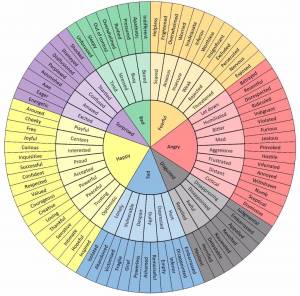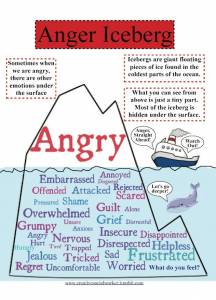Dealing with Anger
When I talk through anger with clients, we consider the emotion ‘anger’ as an umbrella term because so much sits under it. We use it as an all-encompassing term to describe actually upwards of 24 other anger related emotions.
Have a look at the emotions wheel and see how it can be broken down in to what I like to refer to as ‘shades’ of emotions:

When a client tells me they are angry, we have to dig a bit deeper to see what’s really going on there. The exploration of emotions can help with clarity, description and communication so that you and others can better understand how you are or have been feeling.
Another well-used example is the anger iceberg.
Have a look and see if some of the emotions below anger are applicable to how you feel right now about a topic that’s troubling you.

Particularly with anger there can be a sense of red mist or a cloak that covers you if you find yourself in a rage and it can be hard to step away from that until the energy you have finds a way to dissipate.
Anger responses are part of the human condition and enable us to defend ourselves in threatening situations; it becomes problematic if it’s your go-to emotion, impacts on your relationships and violence can also part of your anger experience.
Symptoms of anger:
- Irritability over anything
- Red mist
- Aggression
- Restlessness
- Rage
- Easily distracted and poor concentration levels
- Trivial things tip you over the edge
- A sense of injustice constantly
- Self-loathing
- Feeling foolish and let down
- A lack of faith and trust in processes, people and the world
- Shouting/ arguing
- Throwing objects or resorting to violence
- Physical symptoms similar to anxiety (increased heart rate, sweating, stomach complaints, quicker breathing, tight chest, tension)
- Sulking and sarcasm
- Crying
- Hurt yourself
- Harmful coping strategies such as smoking, drinking, drugs
We often look for external causes in the world and environment around us, which is important, but we forget to consider what is going on personally for us too. If you’re having repeat outbursts and struggling, it’s unlikely to be the traffic jam from earlier that’s the true source of the problem.
If you’re able to incorporate relaxation into your weekly routine, then you’ll find your able to reach a relaxed state much quicker than if you keep a busy schedule and struggle for down-time.
Ways to manage your anger:
- Consider what’s beneath the anger, looking at internal and external causes,
- Problem-solve live issues rather than hold on to them for later,
- Actively manage stress through delegation, relaxation, time off or talking things through before they reach problem stage,
- Slow your breathing down,
- Learn to balance your negative thoughts before pursuing angry reactions,
- Make space for yourself and your hobbies during the week,
- Keep a journal and note down your triggers.
If you find you’re still struggling then therapy can help you understand and change. Click here to make an appointment.

Add Comment